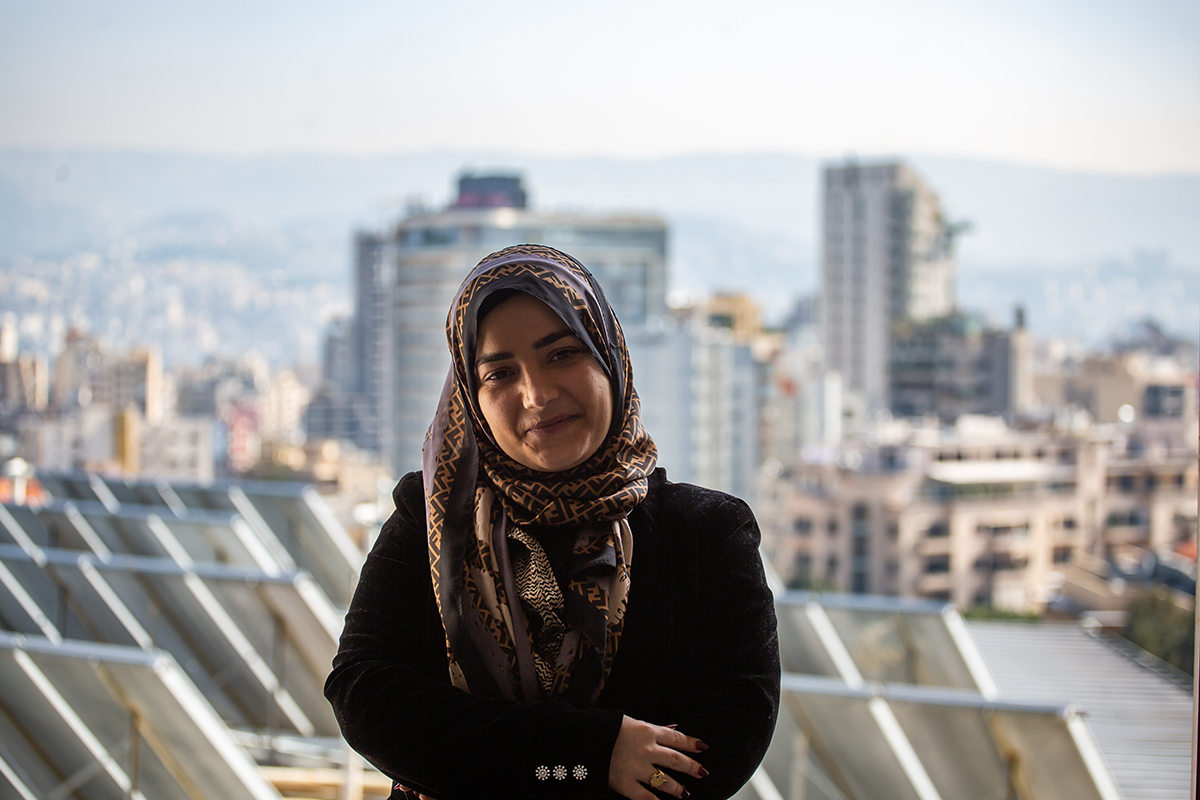Nouhad Awwad an activist boosting the role of youth in environmental issues
Date:
Nouhad Awwad, 31, is the founder of the Lebanese national chapter of the Arab Youth Climate Change and project campaigner at Greenpeace MENA, supporting the implementation of the Ummah For Earth project, a global alliance-led initiative working to empower Muslim communities on climate action. From beach cleanups to planting trees to representing Greenpeace MENA and the Ummah For Earth Alliance at the UN Climate Change Conference (COP26) in Glasgow, Nouhad has been engaging youth in environmental issues since the age of 15.

Nouhad’s environmental responsibility started at home, at an early age “My mother created my awareness of the individual impact on the environment, she made me rethink my actions: things as simple as why we shouldn’t litter and why it’s important to preserve our natural habitats and forests.”
Nouhad earned an undergraduate degree in Environmental Health, then a master’s degree in Environmental Sciences with a focus on environmental policy planning. After graduating, she obtained a scholarship at Duke University and enrolled in a One Health program centered on environmental and public health, and veterinary sciences. It was during her university years at the American University of Beirut that she got acquainted with the United Nations Framework Convention on Climate Change (UNFCCC) and climate action negotiations. She notes “I started reading more about public policies and international law and tried to find like-minded people in the MENA region. That is how I was introduced to the Arab Youth Climate Movement”, an independent body that works to create a generation-wide movement across the Middle East and North Africa to solve the climate crisis.
In 2015, at the age of 25, Nouhad established the Lebanese national chapter of the Arab Youth Climate Movement to establish early awareness on climate change of young children at schools. She says:
“Young children are very enthusiastic about finding solutions to climate change and to tackle the problem of pollution. Older generations seem more reluctant to take action, as they ask for concrete evidence that human activities are contributing to climate change.”
Students at schools engaged in several environmental initiatives led by the Arab Youth Climate Movement. “Students of one school upcycled waste material during their science fair. They also crafted solar panels from aluminum foil and white-water containers covered in cardboard. In the context of another initiative, students collected plastic bottle caps and sold them to a recycling company to buy a wheelchair for a woman in need.”
Awwad thinks women and youth are generally more involved in volunteering for climate action initiatives and activities despite their significant absence from global discussions. “At the 26th UN Climate Change Conference, most key decision-making participants were men; also male-dominated delegations were the overwhelming norm. Women are absent and their voices are not heard. I went to an Adaptation Fund meeting in 2019, organized by United Nations Framework Convention on Climate Change (UNFCCC) and held to finance climate change adaptation and resilience activities, and there was only one woman. Youth are also not represented enough in official delegations and decision-making bodies. It is not enough to say how impressive we are when we take to the streets to protest. We need a seat at the decision-making table.”
Through the Greenpeace campaign Ummah For Earth, Awwad found a platform to make her voice heard and inspire society to turn green. “This project aims at catalyzing a new and resilient Muslim climate movement, in allyship with Muslim groups, key influencers, religious leaders, and cultural ambassadors around the world. We have been working to amplify and support Muslims, so their perspectives and experiences help build and shape the demands of the global climate movement, as well as a stronger focus this year on training young Muslim environmentally conscious individuals on community-led solutions.”
At the first stages of the project, Greenpeace launched an online Story Map enabling activists, scholars, and celebrities to share their personal stories on climate-related issues. So far, approximately 180 stories have been shared on the platform from across the globe. 4.5% of the worldwide signees (out of 90,000) are from Lebanon.
Awwad says “we also launched the Green Guide to Hajj & Umrah and a mobile app which encourages pilgrims embarking on this spiritual journey for Muslims to reflect on their role, and perform the rituals of Hajj and Umrah in an eco-friendly manner to protect the earth and life upon it.”
During the month of Ramadan, in 2021, and through Ummah For Earth, Awwad and the team engaged 90K young Muslims in a “Truth or Dare” game where micro-influencers challenged them to take on a wide range of eco-friendly actions throughout this month. She explains “It allowed them to embrace a climate stewardship role in everyday actions and brought in 12,000 additional supporters for the platform.”
The Green Mosque Initiative was launched at the end of COP26 starting with the solarisation of Glasgow Central Mosque and the release of the 10 Iconic Solar Mosques report. “We are now working to develop this initiative by motivating our audiences to take action in their own community to solarize their mosques - as well as to successfully connect community action with systems change and political action. We aim to support this work through capacity building around organizing and campaigning” she adds.
Awwad stresses that what is most needed today is to raise awareness on the long-term impact of climate change on lives and livelihoods.